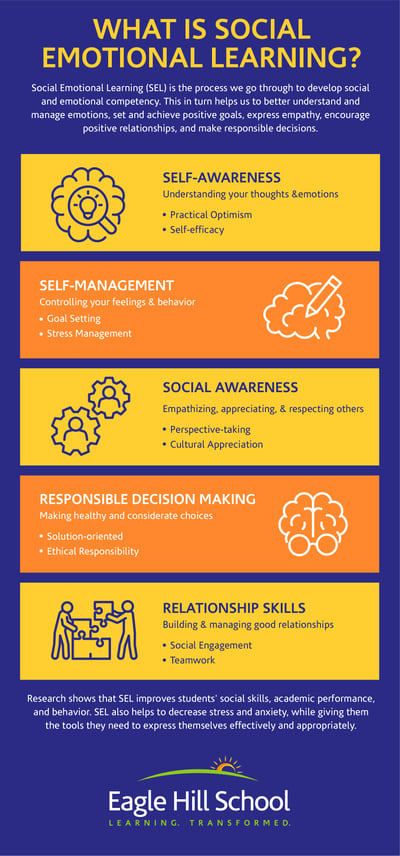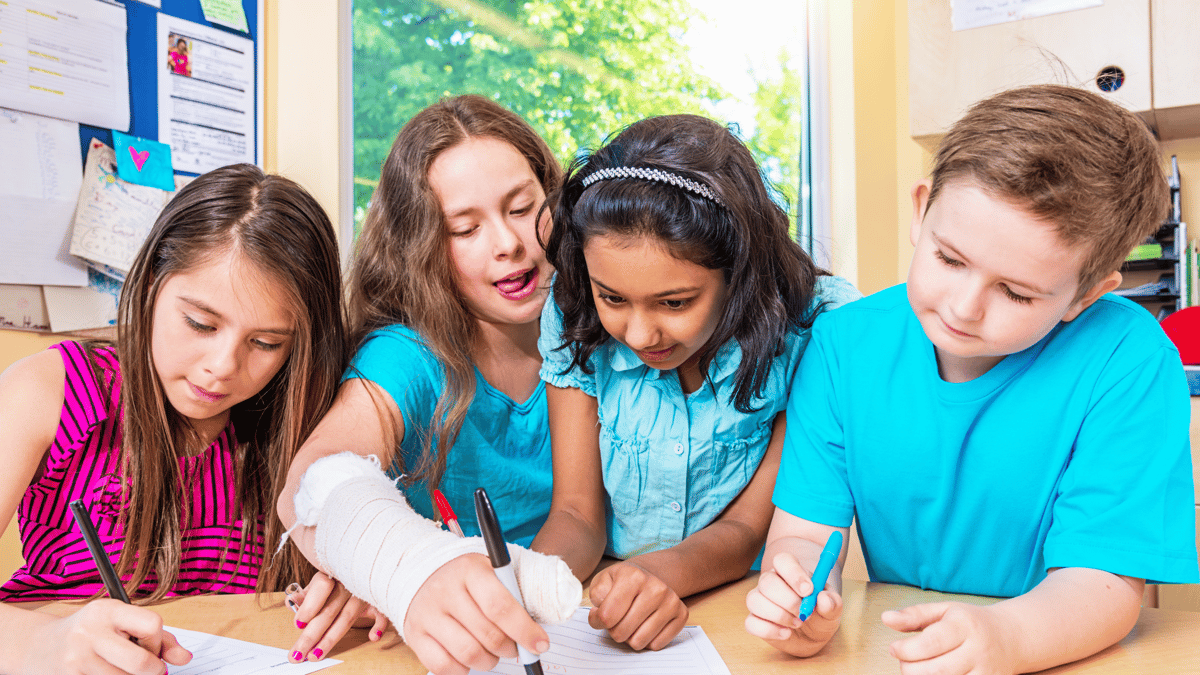The COVID-19 pandemic has greatly impacted the way today’s children express themselves, socialize, and learn. Quarantining, social distancing, and isolation have kept us safe but we’re still not sure what long-term effects these will have on this generation’s youth. Students had to do school virtually from home, cutting off all face-to-face interactions. Children weren't able to see their friends or family for months while stuck inside. Screens were their only form of communication with the outside world.
Now more than ever, Social Emotional Learning (SEL) is critical to a child’s healthy development, especially for those with learning differences, because it gives them a clearer understanding of their strengths versus their needs and encourages them to overcome adversity in any circumstance.
What is Social Emotional Learning?
 As adults, we recognize that success in life, our relationships, and even our careers, depends on having empathy, as well as an understanding of social cues. While these skills develop over time, we did the most amount of learning in our early childhood—in the classroom, on the playground, and navigating the world with a young, curious mind.
As adults, we recognize that success in life, our relationships, and even our careers, depends on having empathy, as well as an understanding of social cues. While these skills develop over time, we did the most amount of learning in our early childhood—in the classroom, on the playground, and navigating the world with a young, curious mind.
According to CASEL, Social Emotional Learning (SEL) is the formal term used to describe the process that we go through to build emotional competency. This in turn helps us to better understand and manage emotions, set and achieve positive goals, express empathy, encourage positive relationships, and make responsible decisions.
These vital skills are learned through the five parts that make up SEL. The five components to social emotional learning are:
- Self-awareness
- Self-management
- Social awareness
- Responsible decision-making
- Relationship skills
Self-Awareness
Self-awareness is the ability to understand your thoughts and emotions. Recognizing your strengths and weaknesses is also a form of self-awareness. Being self-aware is understanding how your thoughts, feelings, and emotions influence your behavior.
It's important to understand how bad thoughts influence bad behavior. By becoming self-aware, you can begin to recognize any bad behavior and correct it.
Self-Management
Self-management is how you control your thoughts, feelings, and reactions. This can look like stress and anger management, self-discipline, impulse control, and goal-setting. Self-management is an important skill to control yourself in various scenarios.
Without self-management, people let their emotions control their actions. This can lead to someone saying or doing hurtful things that have consequences. Self-management helps to avoid these situations.
Social Awareness
Social awareness is having empathy, appreciation, and respect for others. Social awareness is important for understanding the different perspectives of those from diverse backgrounds. Children need to learn compassion for others as well as social norms at a young age to have better success in life.

Having an open mind is part of social awareness. Other people are always going to have different opinions and feelings than you. Being able to understand the other person's side is being socially aware.
Responsible Decision-Making
Responsible decision-making includes analyzing situations, identifying problems, and finding solutions to said problems. Making healthy choices is vital for your well-being and the well-being of others. Students learn how to make decisions that take their safety and welfare into account.
Responsible decision-making teaches students not to give in to peer pressure. Making decisions independent from others' influence is a big part of this component.
Relationship Skills
Relationship skills include communication, teamwork, bonding, and social interaction. Having relationship skills is crucial for building long-lasting relationships with family and friends. Being able to communicate, listen, and work with others are skills learned through SEL.
Sometimes success is dependent on your relationships with others. Good relationships with your teachers will help you do better in school. Your relationships with your bosses will help you get promotions and raises. Good relationships with friends and families will give you a caring support system.
How SEL Helps With Learning Differences
Many students with learning differences can struggle academically or experience difficulty making and managing positive relationships. SEL can help overcome these challenges through empathic practices that in turn help foster a child’s self-confidence. Additional benefits of SEL include success in academics, better emotional management, and positive social interactions.
Research shows that SEL improves students' social skills, academic performance, and behavior. SEL also helps to decrease stress and anxiety, while giving them the tools they need to express themselves effectively and appropriately.
Through SEL, students become more in-tune with their feelings and improvement in students' emotional wellbeing helps decrease disruptions in the classroom. It also means they are able to build better relationships with their peers and teachers. Students also see an improvement in academics due to improved attitudes towards school.
Effects of COVID-19 On Social Development
The COVID-19 pandemic affected every aspect of life. But one aspect that goes undiscussed is the effect the pandemic has on children's emotional and social development. Adjusting to online schooling and quarantine restrictions took its toll, but SEL can help keep kids on the right track.

There is a big difference between talking to someone and messaging them through a screen. Social distancing and isolation caused an increase in social anxiety in young kids. But practicing SEL can help students catch up in their social and mental development.
We take COVID-19 seriously, which is why we have created a plan to safely resume in-school teaching. Measures will be in place to keep our students, teachers, and staff healthy. Check out our COVID-19 plan to learn more about the precautions we are taking to return to campus.
ABOUT EAGLE HILL SCHOOL
Eagle Hill School is a private school for students with learning differences located in Greenwich, Connecticut. Their academic program is designed to help students struggling with dyscalculia, dyslexia, ADHD, executive functioning disorder, dysgraphia, and auditory processing disorder. Specialized remedial learning programs are taught by experienced teachers who help students navigate through learning challenges, preparing them for bright futures ahead.


